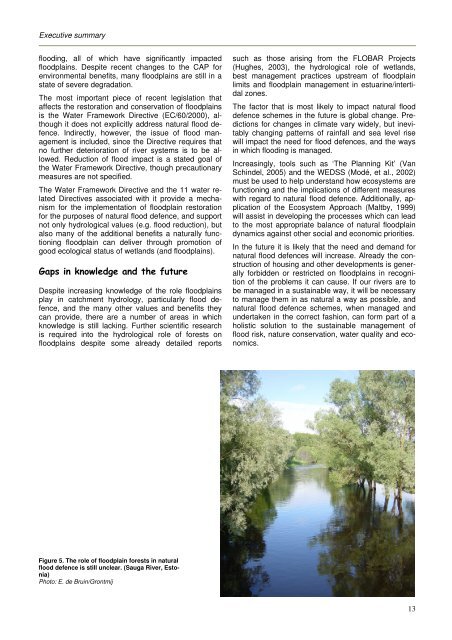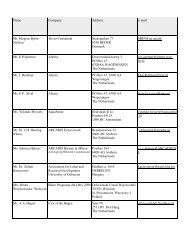HOW TO USE FLOODPLAINS FOR FLOOD RISK ... - SGGW
HOW TO USE FLOODPLAINS FOR FLOOD RISK ... - SGGW
HOW TO USE FLOODPLAINS FOR FLOOD RISK ... - SGGW
You also want an ePaper? Increase the reach of your titles
YUMPU automatically turns print PDFs into web optimized ePapers that Google loves.
Executive summary<br />
flooding, all of which have significantly impacted<br />
floodplains. Despite recent changes to the CAP for<br />
environmental benefits, many floodplains are still in a<br />
state of severe degradation.<br />
The most important piece of recent legislation that<br />
affects the restoration and conservation of floodplains<br />
is the Water Framework Directive (EC/60/2000), although<br />
it does not explicitly address natural flood defence.<br />
Indirectly, however, the issue of flood management<br />
is included, since the Directive requires that<br />
no further deterioration of river systems is to be allowed.<br />
Reduction of flood impact is a stated goal of<br />
the Water Framework Directive, though precautionary<br />
measures are not specified.<br />
The Water Framework Directive and the 11 water related<br />
Directives associated with it provide a mechanism<br />
for the implementation of floodplain restoration<br />
for the purposes of natural flood defence, and support<br />
not only hydrological values (e.g. flood reduction), but<br />
also many of the additional benefits a naturally functioning<br />
floodplain can deliver through promotion of<br />
good ecological status of wetlands (and floodplains).<br />
- ,<br />
Despite increasing knowledge of the role floodplains<br />
play in catchment hydrology, particularly flood defence,<br />
and the many other values and benefits they<br />
can provide, there are a number of areas in which<br />
knowledge is still lacking. Further scientific research<br />
is required into the hydrological role of forests on<br />
floodplains despite some already detailed reports<br />
Figure 5. The role of floodplain forests in natural<br />
flood defence is still unclear. (Sauga River, Estonia)<br />
Photo: E. de Bruin/Grontmij<br />
such as those arising from the FLOBAR Projects<br />
(Hughes, 2003), the hydrological role of wetlands,<br />
best management practices upstream of floodplain<br />
limits and floodplain management in estuarine/intertidal<br />
zones.<br />
The factor that is most likely to impact natural flood<br />
defence schemes in the future is global change. Predictions<br />
for changes in climate vary widely, but inevitably<br />
changing patterns of rainfall and sea level rise<br />
will impact the need for flood defences, and the ways<br />
in which flooding is managed.<br />
Increasingly, tools such as ‘The Planning Kit’ (Van<br />
Schindel, 2005) and the WEDSS (Modé, et al., 2002)<br />
must be used to help understand how ecosystems are<br />
functioning and the implications of different measures<br />
with regard to natural flood defence. Additionally, application<br />
of the Ecosystem Approach (Maltby, 1999)<br />
will assist in developing the processes which can lead<br />
to the most appropriate balance of natural floodplain<br />
dynamics against other social and economic priorities.<br />
In the future it is likely that the need and demand for<br />
natural flood defences will increase. Already the construction<br />
of housing and other developments is generally<br />
forbidden or restricted on floodplains in recognition<br />
of the problems it can cause. If our rivers are to<br />
be managed in a sustainable way, it will be necessary<br />
to manage them in as natural a way as possible, and<br />
natural flood defence schemes, when managed and<br />
undertaken in the correct fashion, can form part of a<br />
holistic solution to the sustainable management of<br />
flood risk, nature conservation, water quality and economics.<br />
13




